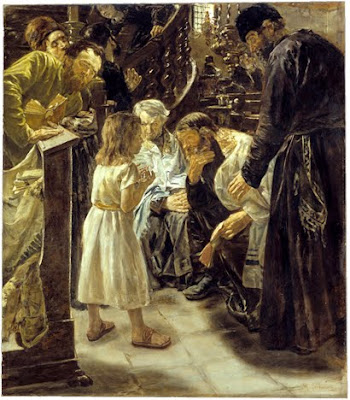The Word for today:
Nehemiah 11
Nehemiah 11
"Chapter 11 of Nehemiah is just a list of names."
It's a list, alright. But I'm not sure that I'd use the adjective 'just.'
Nehemiah is, chronologically speaking, the end of the Old Testament. How can that be, when so much of the Old Testament remains to be read after we finish Nehemiah?
That's because the Old Testament is not arranged chronologically. Instead, it's arranged like this:
· The Law (Genesis-Deuteronomy)
· History (Joshua-Esther)
· Wisdom (Job-Song of Solomon)
· Major Prophets (Isaiah-Daniel)
· "Minor" Prophets (Hosea-Malachi)
· History (Joshua-Esther)
· Wisdom (Job-Song of Solomon)
· Major Prophets (Isaiah-Daniel)
· "Minor" Prophets (Hosea-Malachi)
The Bible is arranged to make literary sense. Thus it is arranged by literary genre. It's like an orchestra on the stage--all the trumpets together over there; all the oboes over there; the cellos there; the violas there; the french horns right here, and the triangle is...where in tarnation is that triangle?
(If the Bible were arranged in chronological order, then the prophets Haggai and Zechariah and Malachi would not be way down at the end of the Old Testament, but mixed right in with the books of Ezra and Nehemiah.)
It's a sublime arrangement, but it takes the Bible student a lifetime to understand just why. I'd try to explain, but, like heaven, it's nearly impossible to describe the sublime until you've been there!
And just like the symphonies of the aforementioned orchestra, the Bible has certain movements or patterns which prepare us for the finale.
That's what we are seeing in Nehemiah chapter 11. This chronologically-last book of the Old Testament is a picture, a pre-figurement, a prediction--a prophecy!--of the grand finale we will see in the last chapters of the New Testament.
That ho-hum list in Nehemiah 11 (the names of the people who are to live in re-built Jerusalem) is a foreshadowing of a list in the book of Revelation -- a list that you won't be bored by, because your name will be on it!
If you trust Jesus to save you from your sins, your name will appear in the Lamb's Book -- a list of all those who will live forever in the heavenly New Jerusalem:
I saw a new heaven and a new earth, for the first heaven and the first earth had passed away, and there was no longer any sea. I saw the Holy City, the new Jerusalem, coming down out of heaven from God, prepared as a bride beautifully dressed for her husband. The wall of the city had twelve foundations, and on them were the names of the twelve apostles of the Lamb. I did not see a temple in the city, because the Lord God Almighty and the Lamb are its temple. The city does not need the sun or the moon to shine on it, for the glory of God gives it light, and the Lamb is its lamp. Nothing impure will ever enter it, nor will anyone who does what is shameful or deceitful, but only those whose names are written in the Lamb's book of life. (1)
Suddenly, it's not "just a list" anymore, is it! Suddenly, in fact, it's sublime.
~~~~~~~~~~~~~~~~~~~~~~
(1) excerpted from Revelation 21; see also Galatians 4:26-28; Philippians 3:20; Hebrews 12:22-24
(1) excerpted from Revelation 21; see also Galatians 4:26-28; Philippians 3:20; Hebrews 12:22-24














